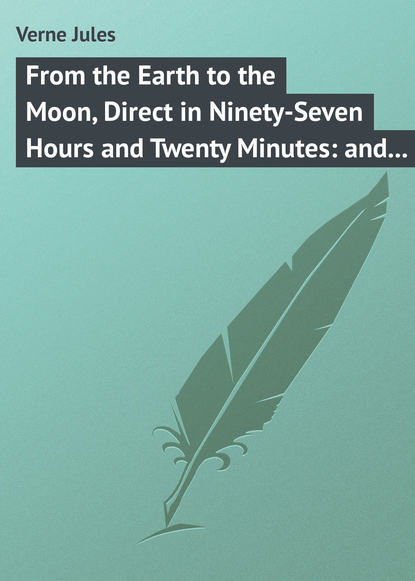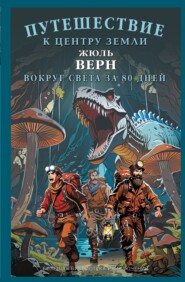По всем вопросам обращайтесь на: info@litportal.ru
(©) 2003-2024.
✖
From the Earth to the Moon, Direct in Ninety-Seven Hours and Twenty Minutes: and a Trip Round It
Настройки чтения
Размер шрифта
Высота строк
Поля
On the 5th of October, at 8 p.m., a dense crowd pressed towards the saloons of the Gun Club at No. 21, Union Square. All the members of the association resident in Baltimore attended the invitation of their president. As regards the corresponding members, notices were delivered by hundreds throughout the streets of the city, and, large as was the great hall, it was quite inadequate to accommodate the crowd of savants. They overflowed into the adjoining rooms, down the narrow passages, into the outer courtyards. There they ran against the vulgar herd who pressed up to the doors, each struggling to reach the front ranks, all eager to learn the nature of the important communication of President Barbicane; all pushing, squeezing, crushing with that perfect freedom of action which is peculiar to the masses when educated in ideas of "self-government."
On that evening a stranger who might have chanced to be in Baltimore could not have gained admission for love or money into the great hall. That was reserved exclusively for resident or corresponding members; no one else could possibly have obtained a place; and the city magnates, municipal councillors, and "select men" were compelled to mingle with the mere townspeople in order to catch stray bits of news from the interior.
Nevertheless the vast hall presented a curious spectacle. Its immense area was singularly adapted to the purpose. Lofty pillars formed of cannon, superposed upon huge mortars as a base, supported the fine ironwork of the arches, a perfect piece of cast-iron lacework. Trophies of blunderbuses, matchlocks, arquebuses, carbines, all kinds of fire-arms, ancient and modern, were picturesquely interlaced against the walls. The gas lit up in full glare myriads of revolvers grouped in the form of lustres, whilst groups of pistols, and candelabra formed of muskets bound together, completed this magnificent display of brilliance. Models of cannon, bronze castings, sights covered with dents, plates battered by the shots of the Gun Club, assortments of rammers and sponges, chaplets of shells, wreaths of projectiles, garlands of howitzers – in short, all the apparatus of the artillerist, enchanted the eye by this wonderful arrangement and induced a kind of belief that their real purpose was ornamental rather than deadly.
At the further end of the saloon the president, assisted by four secretaries, occupied a large platform. His chair, supported by a carved gun-carriage, was modelled upon the ponderous proportions of a 32-inch mortar. It was pointed at an angle of ninety degrees, and suspended upon trunnions, so that the president could balance himself upon it as upon a rocking-chair, a very agreeable fact in the very hot weather. Upon the table (a huge iron plate supported upon six carronnades) stood an inkstand of exquisite elegance, made of a beautifully chased Spanish piece, and a sonnette, which, when required, could give forth a report equal to that of a revolver. During violent debates this novel kind of bell scarcely sufficed to drown the clamour of these excitable artillerists.
In front of the table benches arranged in zigzag form, like the circumvallations of a retrenchment, formed a succession of bastions and curtains set apart for the use of the members of the club; and on this especial evening one might say, "All the world was on the ramparts." The president was sufficiently well known, however, for all to be assured that he would not put his colleagues to discomfort without some very strong motive.
Impey Barbicane was a man of forty years of age, calm, cold, austere; of a singularly serious and self-contained demeanour, punctual as a chronometer, of imperturbable temper and immovable character; by no means chivalrous, yet adventurous withal, and always bringing practical ideas to bear upon the very rashest enterprises; an essentially New-Englander, a Northern colonist, a descendant of the old anti-Stuart Roundheads, and the implacable enemy of the gentlemen of the South, those ancient Cavaliers of the mother-country. In a word, he was a Yankee to the backbone.
Barbicane had made a large fortune as a timber-merchant. Being nominated Director of Artillery during the war, he proved himself fertile in invention. Bold in his conceptions, he contributed powerfully to the progress of that arm and gave an immense impetus to experimental researches.
He was a personage of the middle height, having, by a rare exception in the Gun Club, all his limbs complete. His strongly-marked features seemed drawn by square and rule; and if it be true that, in order to judge of a man's character one must look at his profile, Barbicane, so examined, exhibited the most certain indications of energy, audacity, and sang-froid.
At this moment he was sitting in his armchair, silent, absorbed, lost in reflection, sheltered under his high-crowned hat – a kind of black silk cylinder which always seems firmly screwed upon the head of an American.
Just when the deep-toned clock in the great hall struck eight, Barbicane, as if he had been set in motion by a spring, raised himself up. A profound silence ensued, and the speaker, in a somewhat emphatic tone of voice, commenced as follows: —
"My brave colleagues, too long already a paralyzing peace has plunged the members of the Gun Club in deplorable inactivity. After a period of years full of incidents we have been compelled to abandon our labours, and to stop short on the road of progress. I do not hesitate to state, boldly, that any war which should recall us to arms would be welcome!" (Tremendous applause!)
"But war, gentlemen, is impossible under existing circumstances; and, however we may desire it, many years may elapse before our cannon shall again thunder in the field of battle. We must make up our minds, then, to seek in another train of ideas some field for the activity which we all pine for."
The meeting felt that the president was now approaching the critical point, and redoubled their attention accordingly.
"For some months past, my brave colleagues," continued Barbicane, "I have been asking myself whether, while confining ourselves to our own particular objects, we could not enter upon some grand experiment worthy of the nineteenth century; and whether the progress of artillery science would not enable us to carry it out to a successful issue. I have been considering, working, calculating; and the result of my studies is the conviction that we are safe to succeed in an enterprise which to any other country would appear wholly impracticable. This project, the result of long elaboration, is the object of my present communication. It is worthy of yourselves, worthy of the antecedents of the Gun Club; and it cannot fail to make some noise in the world."
A thrill of excitement ran through the meeting.
Barbicane, having by a rapid movement firmly fixed his hat upon his head, calmly continued his harangue: —
"There is no one among you, my brave colleagues, who has not seen the Moon, or, at least, heard speak of it. Don't be surprised if I am about to discourse to you regarding this Queen of the Night. It is perhaps reserved for us to become the Columbuses of this unknown world. Only enter into my plans, and second me with all your power, and I will lead you to its conquest, and its name shall be added to those of the thirty-six States which compose this Great Union."
"Three cheers for the Moon!" roared the Gun Club, with one voice.
"The moon, gentlemen, has been carefully studied," continued Barbicane; "her mass, density, and weight; her constitution, motions, distance, as well as her place in the solar system, have all been exactly determined. Selenographic charts have been constructed with a perfection which equals, if it does not even surpass, that of our terrestrial maps. Photography has given us proofs of the incomparable beauty of our satellite; in short, all is known regarding the moon which mathematical science, astronomy, geology, and optics can learn about her. But up to the present moment no direct communication has been established with her."
A violent movement of interest and surprise here greeted this remark of the speaker.
"Permit me," he continued, "to recount to you briefly how certain ardent spirits, starting on imaginary journeys, have penetrated the secrets of our satellite. In the seventeenth century a certain David Fabricius boasted of having seen with his own eyes the inhabitants of the moon. In 1649 a Frenchman, one Jean Baudoin, published a 'Journey performed from the Earth to the Moon by Domingo Gonzalez,' a Spanish Adventurer. At the same period Cyrano de Bergerac published that celebrated 'Journeys in the Moon' which met with such success in France. Somewhat later another Frenchman, named Fontenelle, wrote 'The Plurality of Worlds,' a chef-d'œuvre of its time. About 1835 a small treatise, translated from the New York American, related how Sir John Herschell, having been despatched to the Cape of Good Hope for the purpose of making there some astronomical calculations, had, by means of a telescope brought to perfection by means of internal lighting, reduced the apparent distance of the moon to eighty yards! He then distinctly perceived caverns frequented by hippopotami, green mountains bordered by golden lace-work, sheep with horns of ivory, a white species of deer and inhabitants with membranous wings, like bats. This brochure, the work of an American named Locke, had a great sale. But, to bring this rapid sketch to a close, I will only add that a certain Hans Pfaal, of Rotterdam, launching himself in a balloon filled with a gas extracted from nitrogen, thirty-seven times lighter than hydrogen, reached the moon after a passage of nineteen hours. This journey, like all the previous ones, was purely imaginary; still, it was the work of a popular American author – I mean Edgar Poe!"
"Cheers for Edgar Poe!" roared the assemblage, electrified by their president's words.
"I have now enumerated," said Barbicane, "the experiments which I call purely paper ones, and wholly insufficient to establish serious relations with the Queen of Night. Nevertheless, I am bound to add that some practical geniuses have attempted to establish actual communication with her. Thus, a few years ago, a German geometrician proposed to send a scientific expedition to the steppes of Siberia. There, on those vast plains, they were to describe enormous geometric figures, drawn in characters of reflecting luminosity, amongst which was the prop. regarding the 'square of the hypothenuse,' commonly called the 'Ass's bridge' by the French. 'Every intelligent being,' said the geometrician, 'must understand the scientific meaning of that figure. The Selenites, do they exist, will respond by a similar figure; and, a communication being thus once established, it will be easy to form an alphabet which shall enable us to converse with the inhabitants of the moon.' So spoke the German geometrician; but his project was never put into practice, and up to the present day there is no bond in existence between the earth and her satellite. It is reserved for the practical genius of Americans to establish a communication with the sidereal world. The means of arriving thither are simple, easy, certain, infallible – and that is the purpose of my present proposal."
A storm of acclamations greeted these words. There was not a single person in the whole audience who was not overcome, carried away, lifted out of himself by the speaker's words!
Long continued applause resounded from all sides.
As soon as the excitement had partially subsided, Barbicane resumed his speech in a somewhat graver voice.
"You know," said he, "what progress artillery science has made during the last few years, and what a degree of perfection firearms of every kind have reached. Moreover, you are well aware that, in general terms, the resisting power of cannon and the expansive force of gunpowder are practically unlimited. Well! starting from this principle, I ask myself whether, supposing sufficient apparatus could be obtained constructed upon the conditions of ascertained resistance, it might not be possible to project a shot up to the moon?"
At these words a murmur of amazement escaped from a thousand panting chests; then succeeded a moment of perfect silence, resembling that profound stillness which precedes the bursting of a thunderstorm. In point of fact, a thunderstorm did peal forth, but it was the thunder of applause, of cries, and of uproar which made the very hall tremble. The president attempted to speak, but could not. It was fully ten minutes before he could make himself heard.
"Suffer me to finish," he calmly continued. "I have looked at the question in all its bearings, I have resolutely attacked it, and by incontrovertible calculations I find that a projectile endowed with an initial velocity of 12,000 yards per second, and aimed at the moon, must necessarily reach it. I have the honour, my brave colleagues, to propose a trial of this little experiment."
CHAPTER III.
EFFECT OF THE PRESIDENT'S COMMUNICATION
It is impossible to describe the effect produced by the last words of the honorable president – the cries, the shouts, the succession of roars, hurrahs, and all the varied vociferations which the American language is capable of supplying. It was a scene of indescribable confusion and uproar. They shouted, they clapped, they stamped on the floor of the hall. All the weapons in the museum discharged at once could not have more violently set in motion the waves of sound. One need not be surprised at this. There are some cannoneers nearly as noisy as their own guns.
Barbicane remained calm in the midst of this enthusiastic clamour; perhaps he was desirous of addressing a few more words to his colleagues, for by his gestures he demanded silence, and his powerful alarum was worn out by its violent reports. No attention, however, was paid to his request. He was presently torn from his seat and passed from the hands of his faithful colleagues into the arms of a no less excited crowd.
Nothing can astound an American. It has often been asserted that the word "impossible" is not a French one. People have evidently been deceived by the dictionary. In America, all is easy, all is simple; and as for mechanical difficulties, they are overcome before they arise. Between Barbicane's proposition and its realization no true Yankee would have allowed even the semblance of a difficulty to be possible. A thing with them is no sooner said than done.
The triumphal progress of the president continued throughout the evening. It was a regular torchlight procession. Irish, Germans, French, Scotch, all the heterogeneous units which make up the population of Maryland shouted in their respective vernaculars; and the "vivas," "hurrahs," and "bravos" were intermingled in inexpressible enthusiasm.
Just at this crisis, as though she comprehended all this agitation regarding herself, the Moon shone forth with serene splendour, eclipsing by her intense illumination all the surrounding lights. The Yankees all turned their gaze towards her resplendent orb, kissed their hands, called her by all kinds of endearing names. Between eight o'clock and midnight one optician in Jones'-Fall Street made his fortune by the sale of opera-glasses.
Midnight arrived, and the enthusiasm showed no signs of diminution. It spread equally among all classes of citizens – men of science, shopkeepers, merchants, porters, chair-men, as well as "greenhorns," were stirred in their innermost fibres. A national enterprise was at stake. The whole city, high and low, the quays bordering the Patapsco, the ships lying in the basins, disgorged a crowd drunk with joy, gin, and whisky. Every one chattered, argued, discussed, disputed, applauded, from the gentleman lounging upon the barroom settee with his tumbler of sherry-cobbler before him down to the waterman who got drunk upon his "knock-me-down" in the dingy taverns of Fell Point.
About 2 a.m., however, the excitement began to subside. President Barbicane reached his house, bruised, crushed, and squeezed almost to a mummy. A Hercules could not have resisted a similar outbreak of enthusiasm. The crowd gradually deserted the squares and streets. The four railways from Philadelphia and Washington, Harrisburg and Wheeling, which converge at Baltimore, whirled away the heterogeneous population to the four corners of the United States, and the city subsided into comparative tranquillity.
On the following day, thanks to the telegraphic wires, five hundred newspapers and journals, daily, weekly, monthly, or bi-monthly, all took up the question. They examined it under all its different aspects, physical, meteorological, economical, or moral, up to its bearings on politics or civilization. They debated whether the moon was a finished world, or whether it was destined to undergo any further transformation. Did it resemble the earth at the period when the latter was destitute as yet of an atmosphere? What kind of spectacle would its hidden hemisphere present to our terrestrial spheroid? Granting that the question at present was simply that of sending a projectile up to the moon, every one must see that that involved the commencement of a series of experiments. All must hope that some day America would penetrate the deepest secrets of that mysterious orb; and some even seemed to fear lest its conquest should not sensibly derange the equilibrium of Europe.
The project once under discussion, not a single paragraph suggested a doubt of its realization. All the papers, pamphlets, reports – all the journals published by the scientific, literary, and religious societies enlarged upon its advantages; and the Society of Natural History of Boston, the Society of Science and Art of Albany, the Geographical and Statistical Society of New York, the Philosophical Society of Philadelphia, and the Smithsonian of Washington sent innumerable letters of congratulation to the Gun Club, together with offers of immediate assistance and money.
From that day forward Impey Barbicane became one of the greatest citizens of the United States, a kind of Washington of Science. A single trait of feeling, taken from many others, will serve to show the point which this homage of a whole people to a single individual attained.
Some few days after this memorable meeting of the Gun Club, the manager of an English company announced, at the Baltimore theatre, the production of "Much ado about Nothing." But the populace, seeing in that title an allusion damaging to Barbicane's project, broke into the auditorium, smashed the benches, and compelled the unlucky director to alter his playbill. Being a sensible man, he bowed to the public will and replaced the offending comedy by "As you like it;" and for many weeks he realized fabulous profits.
CHAPTER IV.
REPLY FROM THE OBSERVATORY OF CAMBRIDGE
Barbicane, however, lost not one moment amidst all the enthusiasm of which he had become the object. His first care was to reassemble his colleagues in the board-room of the Gun Club. There, after some discussion, it was agreed to consult the astronomers regarding the astronomical part of the enterprize. Their reply once ascertained, they could then discuss the mechanical means, and nothing should be wanting to ensure the success of this great experiment.
A note couched in precise terms, containing special interrogatories, was then drawn up and addressed to the Observatory of Cambridge in Massachusetts. This city, where the first University of the United States was founded, is justly celebrated for its astronomical staff. There are to be found assembled all the most eminent men of science. Here is to be seen at work that powerful telescope which enabled Bond to resolve the nebula of Andromeda, and Clarke to discover the satellite of Sirius. This celebrated institution fully justified on all points the confidence reposed in it by the Gun Club.
So, after two days, the reply so impatiently awaited was placed in the hands of President Barbicane.
It was couched in the following terms: —
"The Director of the Cambridge Observatory to the President of the Gun Club at Baltimore.
"CAMBRIDGE, Oct. 7.

















